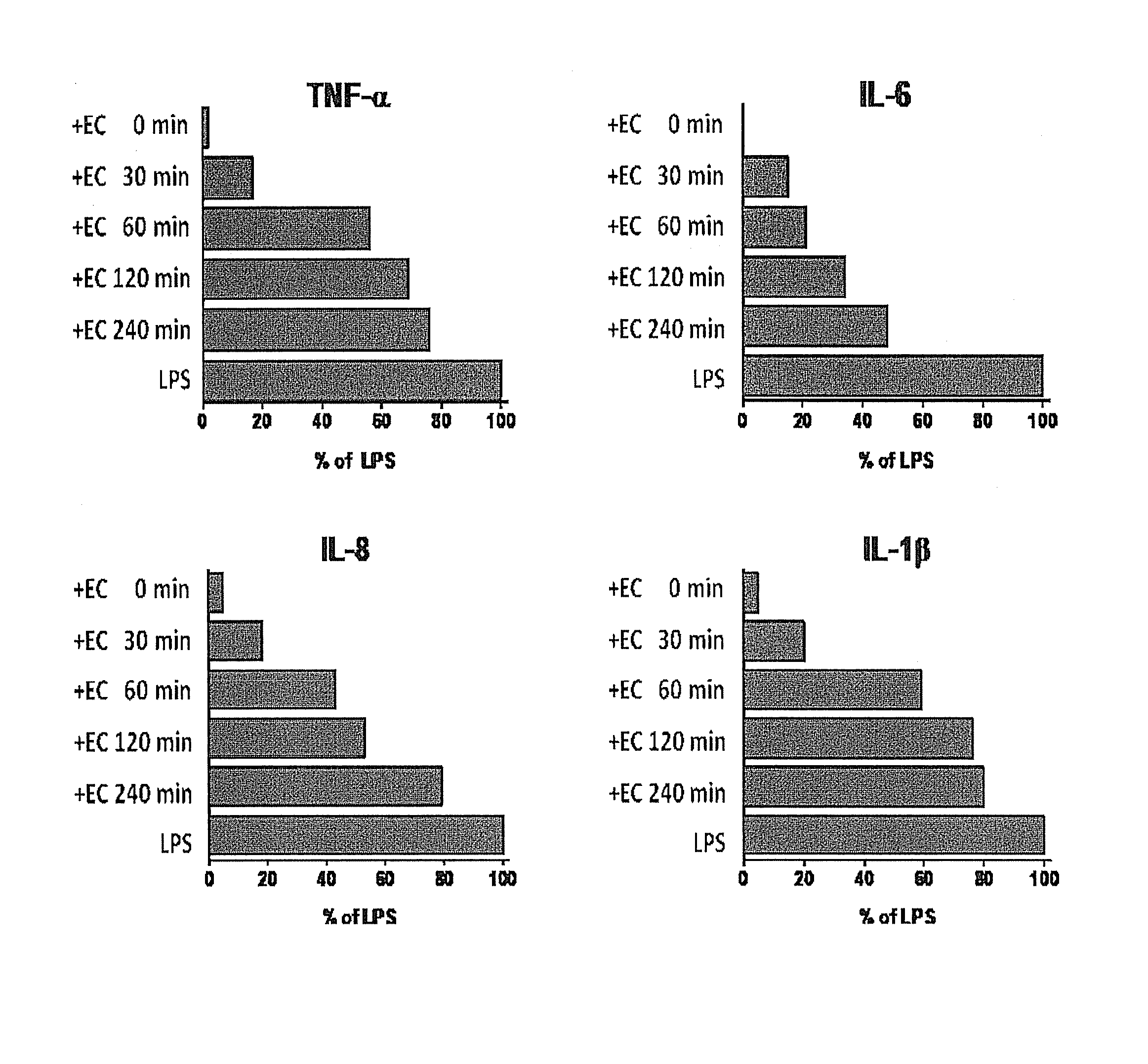Glycolipid fraction from cyanobacteria for treatment of diseases of the oral cavity
a technology of cyanobacteria and glycolipid fraction, which is applied in the field of oral hygiene and oral cavity diseases, can solve the problems of undesirable side effects of broad-spectrum antimicrobial activity, inconvenient use of disinfectants and/or antibacterial agents of this kind,
- Summary
- Abstract
- Description
- Claims
- Application Information
AI Technical Summary
Problems solved by technology
Method used
Image
Examples
example 1
Preparation of the Extract from Oscillatoria Planktothrix Fp1 Cultures
[0027]The extract was prepared from the cyanobacterium Oscillatoria Planktothrix FP1 (12) by adaptation to the current needs of the method for cold extraction of lipopolysaccharides (LPS), that was used so far only for LPS extraction from gram-negative bacteria, as described in Yi et al. In detail, cyanobacteria (CCAP 2 No. 1459 / 45, 9 Jul. 2008, Scotland UK) were diluted 1:1 in water, mixed with 3 volumes (where the volume unit is the total volume of cyanobacteria diluted in water) of Tri-reagent (Sigma-Aldrich cat. N. T3934) and 1 volume of chloroform and incubated for 10 minutes at room temperature.
[0028]At the end of incubation, centrifugation was performed at 2000×g for 15 min and the supernatant (aqueous phase) containing the active fraction was collected and evaluated by polyacrylamide gel electrophoresis followed by silver staining. This was followed by a further extraction from cyanobacteria, by re-additio...
example 2
Inhibition of the Production of Pro-Inflammatory Cytokines Induced by P. gingivalis LPS
[0030]The glycolipid fraction from Oscillatoria Planktothrix FP1, prepared as described in the previous example, was used to study in vitro the effects on the production of pro-inflammatory cytokines in a human monocytic cell line (THP1). The monocytes were brought to a concentration of 0.5×106 cells / ml, seeded in 24-well plates (1 ml / well) and incubated with LPS from P. gingivalis at a concentration of 1 μg / ml in the absence or presence of the cyanobacterial extract at various concentrations (1-20 μg / ml). Cultures were also made only in the presence of cyanobacterial extract at a concentration of 10 μg / ml. Cultures were incubated at 37° C. in a humidified incubator with 5% CO2 for 18-20 hours. After incubation, supernatants were collected and pro-inflammatory cytokines were quantified by use of a sandwiched Diaclone ELISA Kit (human TNF-alpha ELISA kit cat. N.950.090.096, human IL-6 ELISA kit cat...
example 3
Evaluation of Toxicity, Stability and Solubility of the Cyanobacterial Extract in Composite Mixtures
Toxicity
[0035]The Oscillatoria Planktothrix FP1 extract was tested both in different cell lines (THP1, RAW 264.7, SKMEL-28, HEY4, SHSY-5Y) and in mononuclear cells obtained from peripheral blood (PBMC, peripheral blood mononuclear cells) at concentrations comprised between 1 and 100 μg / ml and proved to be non-toxic even when it was used at the highest concentration (100 μg / ml).
Stability in Solution
[0036]The Oscillatoria Planktothrix FP1 extract prepared as described in example 1 was mixed with chlorhexidine digluconate in water for 30 min at room temperature; subsequently, after purification to remove chlorhexidine, its effectiveness on monocyte cell cultures was retested. The results show that the glycolipid extract retains its activity, as measured by the ability to inhibit production of TNF-alpha induced by LPS from P. gingivalis. Inhibitions were 95%, 96% and 99% in the presence o...
PUM
| Property | Measurement | Unit |
|---|---|---|
| concentration | aaaaa | aaaaa |
| concentration | aaaaa | aaaaa |
| concentration | aaaaa | aaaaa |
Abstract
Description
Claims
Application Information
 Login to View More
Login to View More - R&D
- Intellectual Property
- Life Sciences
- Materials
- Tech Scout
- Unparalleled Data Quality
- Higher Quality Content
- 60% Fewer Hallucinations
Browse by: Latest US Patents, China's latest patents, Technical Efficacy Thesaurus, Application Domain, Technology Topic, Popular Technical Reports.
© 2025 PatSnap. All rights reserved.Legal|Privacy policy|Modern Slavery Act Transparency Statement|Sitemap|About US| Contact US: help@patsnap.com

